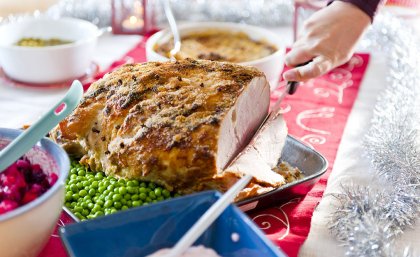
Following a few simple food preparation guidelines can help reduce unwanted cases of food poisoning for family and friends this festive season.
The University of Queensland’s School of Agriculture and Food Sciences researcher Associate Professor Mark Turner said food poisoning often occurred when food smelled and tasted normal as the microbes causing illness were, in most cases, not the ones causing food spoilage.
“Nobody - including Santa - wants a Salmonella or E. coli attack so ‘if in doubt, throw it out’ and follow a few simple rules,” he counselled.
1. Keep it hot or cold
“Keep your food either side of the temperature danger zone of 5°C to 60°C where bacteria can multiply,” Dr Turner said.
“That means keeping hot foods hot (more than 60°C) or consuming within four hours if they fall below this temperature; and keeping cold foods cold (less than 5°C).
“This includes perishable foods (such as dips, meats, seafood, salads, and desserts) which should be stored in the fridge; and cooked foods, once they have finished steaming, which can be placed in the fridge.”
2. Keep your fridge cold
“Set your fridge at or under 5°C and avoid opening it frequently on hot days,” Dr Turner said.
“Place more perishable foods at the back of the fridge where it is cooler, and any raw meats in a sealed plastic container at the bottom shelf (so juices do not drip on to other foods).
“If you’re hosting a party, chill drinks in an esky with ice, rather than stress an overcrowded fridge.
“Avoid putting many warm/hot items in the fridge which can warm other items.”
3. Keep the BBQ hot and cook meat well
Cook all meats to 75°C in the thickest part of the meat, which can be checked with a meat thermometer.
“Solid cuts of beef can be cooked rare or medium-rare for example, as the bacteria are located on the surface and will be killed,” Dr Turner said.
“Minced meats (such as meat patties), poultry and sausages can contain bacteria in the middle, so you need to cook throughout.”
4. Keep it clean
Avoid cross-contamination by using different tongs and plates for raw and cooked meats, and washing hands before cooking and any time after handling raw meat.
5. Keep your left-overs in mind
“Refrigerate leftovers as soon as possible and throw out unrefrigerated leftovers if it’s been more than four hours,” Dr Turner said.
“Consume any leftovers within two to three days.”
More information is available at the Food Safety Information Council site, which includes ham storage and turkey cooking advice.
Media: Associate Professor Mark Turner, m.turner2@uq.edu.au, +61 7 336 57364.
.jpg)











